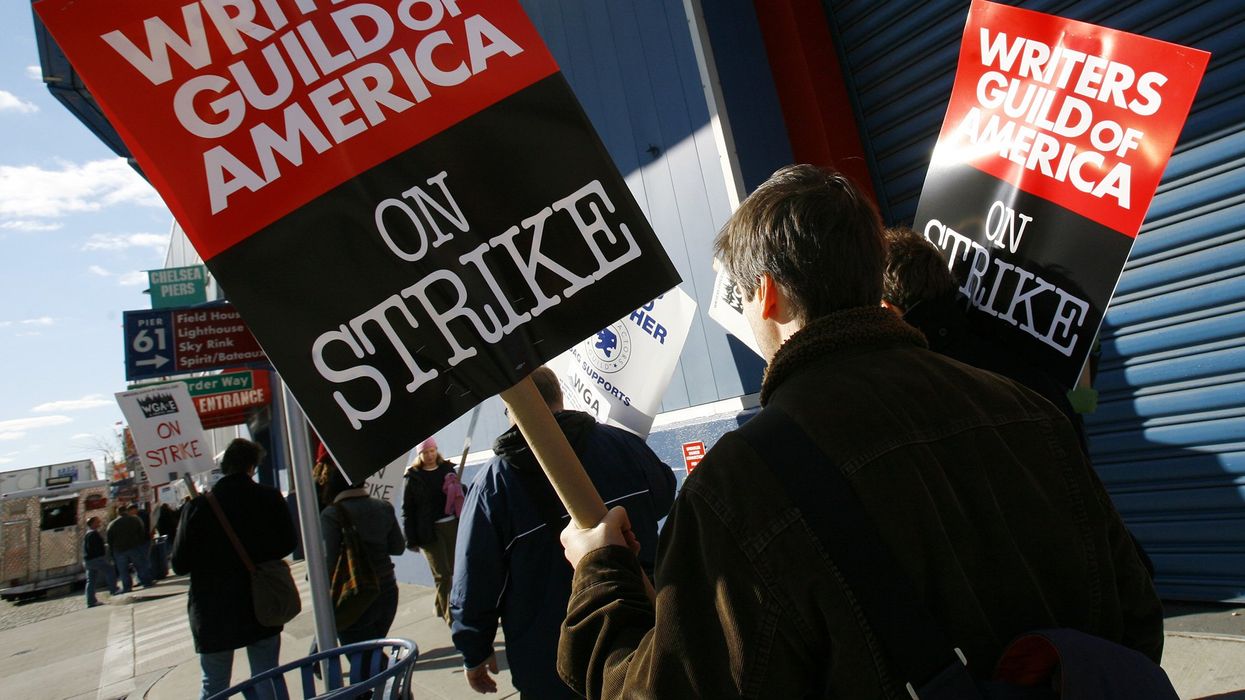(CNN) — Writers for television, movies and streaming shows have voted overwhelmingly to go on strike if no labor deal can be reached before a May 1 deadline.
The vote announced Monday afternoon showed 97.9 percent of participating union members voting to approve a potential strike.
If a strike happens, it would be the first in the industry since 2007, and it would bring production on many shows and films to a halt. The 2007 strike lasted 100 days.
The Writers Guild of America, the union that represents the writers, says it needs to make substantial changes to the way that writers are compensated because of the shift to streaming services from traditional films and cable and broadcast networks.
"This is not an ordinary negotiating cycle," said Danielle Sanchez-Witzel, a member of the union's negotiating team, in a video message to members at the start of voting a week ago. "We are fighting for writers' economic survival and stability of our profession."
"So far, the companies have been unwilling to engage with us in a meaningful way," said Eric Heisserer, another member of the negotiating team, in the same recorded message.
"We're disappointed, but not surprised. The companies have never taken our issues seriously without at least the threat of a fight," said Sanchez-Witzel.
The vote result itself was not a surprise. Unions typically conduct a strike authorization vote during the course of negotiations, and they almost always get approved by overwhelming margins. That does not necessarily mean a strike will occur, as deals are typically struck close to the strike deadline, if not afterward.
"A strike authorization vote has always been part of the WGA's plan, announced before the parties even exchanged proposals," said a statement from the Alliance of Motion Picture and Television Producers, which is negotiating on behalf of management. "Its inevitable ratification should come as no surprise to anyone."
AMPTP represents Amazon, Apple, CBS, Disney, NBC Universal, Netflix, Paramount Global, Sony, and CNN's parent company, Warner Bros. Discovery. Many of those companies have announced deep job cuts and other cost-cutting measures in recent months.
Negotiators for the AMPTP and the Writers Guild met at the negotiating table on Friday, according to one producer close to negotiations.
AMPTP gave WGA new proposals in response to some of the Guild's contract requests — and is awaiting review and feedback on those Monday, along with the strike vote results, the producer said.
Despite its stated desire to reach a deal, AMPTP's statement also suggested the two sides are far apart with the deadline, now two weeks away.
"Our goal is, and continues to be, to reach a fair and reasonable agreement," said AMPTP. "An agreement is only possible if the Guild is committed to turning its focus to serious bargaining by engaging in full discussions of the issues with the companies and searching for reasonable compromises."
The Guild wants to factor the growth of streaming into compensation packages for its members. Residual fees — or money paid when a film or series is rerun or aired on broadcast — has helped pad the wallets of writers for years. But those fees are vanishing in the streaming era, which is where a great deal of projects ultimately land these days.
Additionally, with the rise of streaming, there are often fewer episodes in a show's season than before. Shows that run on broadcast networks typically include more than 20 episodes in a season. Shows that are ordered by Netflix and others often feature 10 or fewer episodes per season.
With the artificial intelligence revolution being set into motion, the guild is also asking for studios to establish standards around the use of the technology. It wants the use of AI regulated, in terms of material created for the studios.
— CNN's Oliver Darcy contributed to this report
The-CNN-Wire
™ & © 2023 Cable News Network, Inc., a Warner Bros. Discovery Company. All rights reserved.


















































